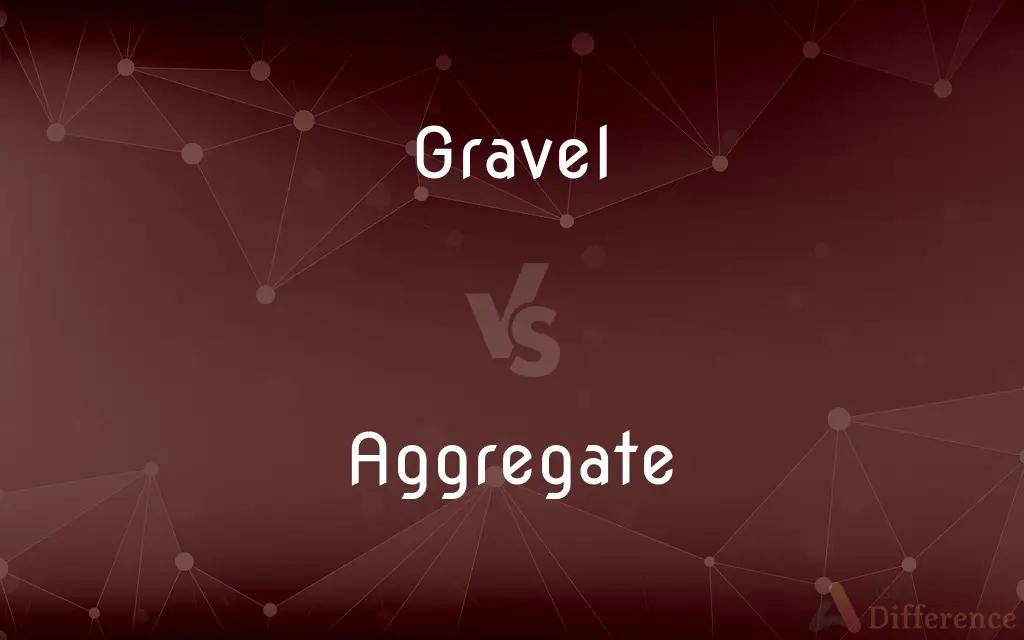Gravel vs. Aggregate — What's the Difference?
By Tayyaba Rehman — Updated on November 5, 2023
Gravel is a type of coarse aggregate consisting of fragmented stones, while aggregate is a broad category of particulate material used in construction, including sand, gravel, and crushed stone.

Difference Between Gravel and Aggregate
Table of Contents
ADVERTISEMENT
Key Differences
Gravel refers specifically to a collection of loose rock fragments, often resulting from the natural erosion of larger rocks. Its size can vary from about 2mm to 63mm. Aggregate, on the other hand, encompasses gravel but also includes sand, crushed stone, slag, and recycled concrete, used in varying proportions to form concrete or other composite materials.
While gravel is rounded and typically found in natural deposits, aggregates can be either rounded or angular, including processed materials like crushed stone. Gravel is one component of aggregate materials and is primarily used for drainage or as a base material for highways and driveways. Aggregates are selected based on their intended use in construction, considering properties like size, shape, and strength.
The composition of gravel is exclusively rock fragments, which can be from a variety of rock types. Aggregates include not only rock fragments but also other materials that can fill voids and create a stable mass. For instance, sand, another type of aggregate, is often used to fill the spaces between the larger pieces of gravel in a mix.
In usage, gravel can be found in landscaping, water filtration, and outdoor recreation surfaces such as pathways. Aggregate has a more technical application and is a critical material in civil engineering projects, particularly in the creation of concrete, where it accounts for 60-75% of the volume.
Quality control for gravel focuses on size distribution and cleanliness. For aggregates, the focus is broader, including hardness, resistance to abrasion, and the potential for alkali-silica reaction. Both gravel and aggregate industries are regulated to ensure materials meet specific engineering standards.
ADVERTISEMENT
Comparison Chart
Definition
Natural water-worn rock fragments
Composite of sand, gravel, stone, used in construction
Composition
Homogeneous, mostly rounded stones
Heterogeneous, can be rounded or angular, diverse types
Uses
Landscaping, drainage, surfacing
Concrete production, construction base, fill material
Size Range
Typically 2mm to 63mm
Varies widely, from fine sand to large stones
Processing
Often natural, sometimes processed
Often processed to achieve desired characteristics
Compare with Definitions
Gravel
Gravel is often used for decorative purposes in landscaping.
Colorful gravel lined the garden beds.
Aggregate
Aggregate is a broad category of coarse to medium-grained particulate material.
The aggregate for the concrete mix includes both sand and small stones.
Gravel
Gravel is a loose aggregation of rock fragments.
The driveway was covered with fresh gravel.
Aggregate
Aggregate can be composed of materials like crushed stone, sand, and gravel.
The company supplied various types of aggregate for construction.
Gravel
Gravel is used in construction as a permeable base layer.
We spread gravel before laying the concrete sidewalk.
Aggregate
Aggregate is often sourced from quarries and can be recycled from construction waste.
Recycled aggregate was used in the eco-friendly building's foundation.
Gravel
Gravel's size typically ranges from pea-sized to boulder-like stones.
The children played on a heap of pea gravel at the park.
Aggregate
A whole formed by combining several separate elements
The council was an aggregate of three regional assemblies
Gravel
Gravel is a loose aggregation of rock fragments. Gravel is classified by particle size range and includes size classes from granule- to boulder-sized fragments.
Aggregate
A material or structure formed from a mass of fragments or particles loosely compacted together
The specimen is an aggregate of rock and mineral fragments
Gravel
An unconsolidated mixture of rock fragments or pebbles.
Aggregate
Formed or calculated by the combination of several separate elements; total
The aggregate amount of grants made
Gravel
(Medicine) The sandlike granular material of urinary calculi.
Aggregate
Form or group into a class or cluster
Socio-occupational groups aggregate men sharing similar kinds of occupation
The butterflies aggregate in dense groups
Gravel
To apply a surface of rock fragments or pebbles to.
Aggregate
Constituting or amounting to a whole; total
Aggregate sales in that market.
Gravel
To confuse; perplex.
Aggregate
(Botany) Crowded or massed into a dense cluster.
Gravel
(Informal) To irritate.
Aggregate
Composed of a mixture of minerals separable by mechanical means.
Gravel
(uncountable) Small fragments of rock, used for laying on the beds of roads and railways, and as ballast.
Aggregate
A total considered with reference to its constituent parts; a gross amount
"An empire is the aggregate of many states under one common head" (Edmund Burke).
Gravel
A type or grade of small rocks, differentiated by mineral type, size range, or other characteristics.
Aggregate
The mineral materials, such as sand or stone, used in making concrete.
Gravel
A particle from 2 to 64 mm in diameter, following the Wentworth scale.
Aggregate
To gather into a mass, sum, or whole
Aggregated the donations into one bank account.
Gravel
Kidney stones; a deposit of small calculous concretions in the kidneys and the urinary or gall bladder; also, the disease of which they are a symptom.
Aggregate
To amount to; total
Revenues will aggregate more than one million dollars.
Gravel
A lameness in the foot of a horse, usually caused by an abscess.
Aggregate
To collect (content from different sources on the internet) into one webpage or newsreader.
Gravel
(rare) Inability to see at night; night blindness.
Aggregate
To come together or collect in a mass or whole
"Some [bacteria]aggregate so closely as to mimic a multicellular organism" (Gina Kolata). "The first stars began to form when hydrogen and helium gas left over from the Big Bang aggregated into dense clouds" (Paul Davies).
Gravel
Gravel cycling, a discipline in cycling different from road cycling, mountain biking or cyclocross, for a large part on gravel roads, typically with a dedicated gravel bike
Aggregate
A mass, assemblage, or sum of particulars; something consisting of elements but considered as a whole.
Gravel
(transitive) To apply a layer of gravel to the surface of a road, etc.
Aggregate
A mass formed by the union of homogeneous particles; – in distinction from a compound, formed by the union of heterogeneous particles.
Gravel
To puzzle or annoy.
Aggregate
A set collection of objects.
Gravel
To run (as a ship) upon the gravel or beach; to run aground; to cause to stick fast in gravel or sand.
Aggregate
(music) The full chromatic scale of twelve equal tempered pitches.
Gravel
To check or stop; to confound; to perplex.
Aggregate
(sports) The total score in a set of games between teams or competitors, usually the combination of the home and away scores.
Gravel
To hurt or lame (a horse) by gravel lodged between the shoe and foot.
Aggregate
(roofing) Crushed stone, crushed slag or water-worn gravel used for surfacing a built-up roof system.
Gravel
Small stones, or fragments of stone; very small pebbles, often intermixed with particles of sand.
Aggregate
Solid particles of low aspect ratio added to a composite material, as distinguished from the matrix and any fibers or reinforcements; especially the gravel and sand added to concrete.
Gravel
A deposit of small calculous concretions in the kidneys and the urinary or gall bladder; also, the disease of which they are a symptom.
Aggregate
(Buddhism) Any of the five attributes that constitute the sentient being.
Gravel
To cover with gravel; as, to gravel a walk.
Aggregate
A mechanical mixture of more than one phase.
Gravel
To run (as a ship) upon the gravel or beach; to run aground; to cause to stick fast in gravel or sand.
When we were fallen into a place between two seas, they graveled the ship.
Willam the Conqueror . . . chanced as his arrival to be graveled; and one of his feet stuck so fast in the sand that he fell to the ground.
Aggregate
Formed by a collection of particulars into a whole mass or sum; collective; combined; added up.
Gravel
To check or stop; to embarrass; to perplex.
When you were graveled for lack of matter.
The physician was so graveled and amazed withal, that he had not a word more to say.
Aggregate
Consisting or formed of smaller objects or parts.
Gravel
To hurt or lame (a horse) by gravel lodged between the shoe and foot.
Aggregate
Formed into clusters or groups of lobules.
Aggregate glands
Gravel
Rock fragments and pebbles
Aggregate
(botany) Composed of several florets within a common involucre, as in the daisy; or of several carpels formed from one flower, as in the raspberry.
Gravel
Cause annoyance in; disturb, especially by minor irritations;
Mosquitoes buzzing in my ear really bothers me
It irritates me that she never closes the door after she leaves
Aggregate
Having the several component parts adherent to each other only to such a degree as to be separable by mechanical means.
Gravel
Cover with gravel;
We gravelled the driveway
Aggregate
United into a common organized mass; said of certain compound animals.
Gravel
Be a mystery or bewildering to;
This beats me!
Got me--I don't know the answer!
A vexing problem
This question really stuck me
Aggregate
(transitive) To bring together; to collect into a mass or sum.
The aggregated soil.
Gravel
Unpleasantly harsh or grating in sound;
A gravelly voice
Aggregate
To add or unite (e.g. a person), to an association.
Gravel
Gravel can consist of various rock types, like limestone or granite.
The gravel path sparkled with bits of quartz and granite.
Aggregate
(transitive) To amount in the aggregate to.
There are ten loads, aggregating five hundred bushels.
Aggregate
To bring together; to collect into a mass or sum. "The aggregated soil."
Aggregate
To add or unite, as, a person, to an association.
It is many times hard to discern to which of the two sorts, the good or the bad, a man ought to be aggregated.
Aggregate
To amount in the aggregate to; as, ten loads, aggregating five hundred bushels.
Aggregate
Formed by a collection of particulars into a whole mass or sum; collective.
The aggregate testimony of many hundreds.
Aggregate
Formed into clusters or groups of lobules; as, aggregate glands.
Aggregate
Composed of several florets within a common involucre, as in the daisy; or of several carpels formed from one flower, as in the raspberry.
Aggregate
Having the several component parts adherent to each other only to such a degree as to be separable by mechanical means.
Aggregate
United into a common organized mass; - said of certain compound animals.
Aggregate
A mass, assemblage, or sum of particulars; as, a house is an aggregate of stone, brick, timber, etc.
Aggregate
A mass formed by the union of homogeneous particles; - in distinction from a compound, formed by the union of heterogeneous particles.
Aggregate
A sum total of many heterogenous things taken together
Aggregate
The whole amount
Aggregate
Amount in the aggregate to
Aggregate
Gather in a mass, sum, or whole
Aggregate
Gathered or tending to gather into a mass or whole;
Aggregate expenses include expenses of all divisions combined for the entire year
The aggregated amount of indebtedness
Aggregate
Formed of separate units in a cluster;
Raspberries are aggregate fruits
Aggregate
Aggregate forms the bulk of concrete and asphalt mixtures.
We ordered tons of aggregate for the new highway project.
Aggregate
Aggregate materials are essential in providing structural integrity in building.
Engineers tested the aggregate for its strength and durability.
Common Curiosities
What is the primary use of gravel?
Gravel is primarily used for driveways, roads, and as a component in concrete.
How is aggregate different from gravel?
Aggregate is a construction material that may include gravel, but also encompasses sand, crushed stone, and other particulate materials.
Are aggregates naturally occurring?
Aggregates can be naturally occurring or processed from quarried materials.
Can gravel be considered an aggregate?
Yes, gravel is a type of coarse aggregate.
Can the term 'aggregate' refer to a single type of material?
No, 'aggregate' refers to a composite of different sizes and types of materials.
Are there environmental concerns associated with gravel?
Yes, excessive gravel mining can lead to habitat destruction and sedimentation in waterways.
Is gravel more expensive than other aggregates?
The cost of gravel varies depending on the type and location, but it can be more expensive than simpler aggregates like sand.
What exactly is gravel?
Gravel is a natural accumulation of rounded rock fragments.
How are aggregates categorized?
Aggregates are categorized by size, from fine sand to coarse stones, and by their intended use in construction.
Do gravel and aggregate have the same engineering properties?
No, each has distinct properties suitable for specific applications in construction.
What determines the quality of gravel and aggregate?
Quality is determined by particle size, shape, hardness, and the absence of contaminants.
What's the environmental impact of aggregate production?
Aggregate production can lead to land disturbance, dust, noise, and water pollution if not managed properly.
What is the role of aggregate in concrete?
Aggregate provides volume, stability, and resistance to wear and erosion in concrete.
Is recycled material considered aggregate?
Yes, recycled concrete and other materials can be processed into aggregate.
Are there specific standards for gravel and aggregate?
Yes, there are ASTM and other industry standards that specify the qualities needed for different construction applications.
Share Your Discovery

Previous Comparison
Safety vs. Welfare
Next Comparison
Nontransient vs. TransientAuthor Spotlight
Written by
Tayyaba RehmanTayyaba Rehman is a distinguished writer, currently serving as a primary contributor to askdifference.com. As a researcher in semantics and etymology, Tayyaba's passion for the complexity of languages and their distinctions has found a perfect home on the platform. Tayyaba delves into the intricacies of language, distinguishing between commonly confused words and phrases, thereby providing clarity for readers worldwide.














































